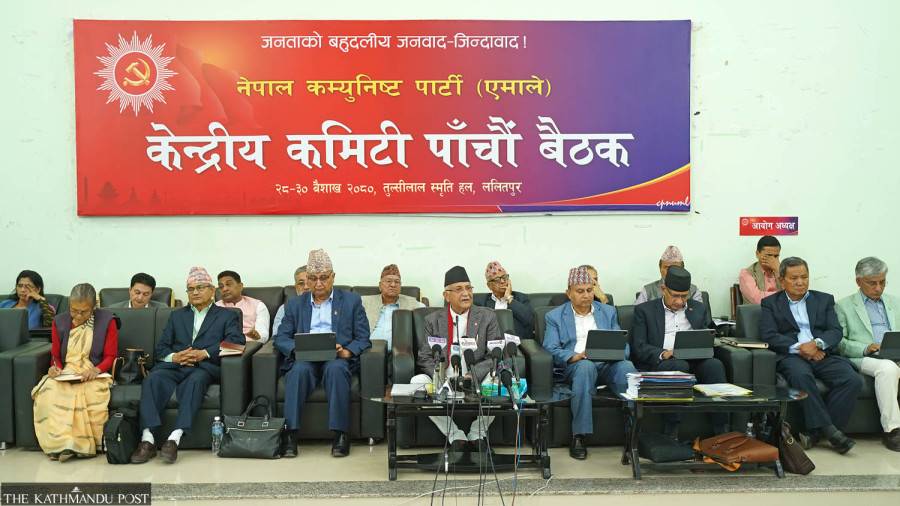Politics
UML aims to win a majority next elections. Can it?
Following the ‘Mission Grassroots’ campaign, party leaders reckon they have found a way. Analysts are doubtful.
Tika R Pradhan
Terming their two-month-long Mission Grassroots, a campaign started to strengthen the party’s ideological and organisational bases, a ‘success’, the CPN-UML has decided to work in a way so as to win an absolute majority in the next general elections.
The campaign was designed after the UML leaders felt the urge to reinvigorate the party’s historically strong but weakening organisational base following the reverses in the November 20 polls last year.
The party came second in the 2022 polls, after the CPN (Maoist Centre) forged an electoral alliance with the Nepali Congress. This was in contrast to the 2017 elections in which the party had gained the first position with 121 seats.
The party was under tremendous pressure to strengthen its organisational base after the Maoist Centre—the party whose support is crucial for both the UML and the Congress to muster a majority in Parliament—continued to side with the Congress in the power equation.
“This meeting of the central committee has decided to extend the mission grassroots as Mission-84 or Mission-150—to ensure a majority in the general elections set to take place in 2084 BS,” said Krishna Rai, a politburo member. “Our target is to get 150 seats [in the 275-strong federal lower house] in the next polls, for which we will work harder than ever.”
Due to the party’s merger with the Maoist Centre in 2018 to form the Nepal Communist Party (NCP), the party committees were almost defunct with a large number of members inactive. Many had no defined roles in the organisation of the unified party.
“Actually, the mission found that around a third of our members failed to renew their membership, which was perhaps a reason for the passiveness of a large number of party workers,” Rai told the Post.
The party’s main goal was to update the records of the party’s organised members, and the grassroots campaign accomplished 50 percent of the set goals. The campaign renewed contacts down to the area committees—the lowest rung of the party organisation.
Bishnu Rijal, another UML leader who is also the deputy head of the party’s publicity department, said the party has received 119,095 new applications for membership, while 13,238 have already joined it recently.
Despite the two-month-long campaign, the party, however, could not improve its performance in the by-elections. The UML got a drubbing in the April 23 by-elections that were held in three different constituencies—Bara-2, Chitwan-2 and Tanahun-1.
Though the party didn’t lose any seats, it got significantly fewer votes in the three constituencies compared to what it amassed in the November 20 polls last year.
The party gave six major tasks to leaders during the mission—renewal and distribution of new memberships, identifying problems at the local level, facilitating the local units to resolve their internal disputes, sending unsolved issues to the concerned party committees, attracting promising youths to the party, maintaining the committee system, and helping with the documentation of party members.
According to multiple leaders the Post spoke to, the UML believes that the rise of the newer forces was nothing but an expression of dissatisfaction with old parties and that sentiment could be addressed by such campaigns.
The party plans to bring to its organisation at least three percent of the total population in all wards of the country and to win at least 51 percent votes for securing a lower house majority in the next polls.
“We will complete conventions of all our party committees in the next 12 months, finding fresh leaders to rejuvenate the party,” said Thakur Gaire, another politburo member. “By developing a curriculum, we will also train committees at all levels.”
Under its awareness drive, the party will start nationwide campaigns and struggles against corruption and black marketeering besides raising the issues of livelihoods both in Parliament and on the streets.
The party leaders said they have gotten over 100,000 suggestions, comments and criticisms during their two-month-long campaign, many of which are also directed at the UML leadership.
“Some of them criticised the way our leadership managed the party and have asked for a clean-up right from the top,” said a UML politburo member asking not to be named fearing retribution. “They want the party to take collective decisions, instead of the chair coming to unilateral decisions.”
The fifth central committee meeting held after almost a year was focused on the grassroots mission under the broad campaign of rejuvenating the party whose committees continued to slacken.
In the context of the party’s top leaders being accused of corruption, the central committee decided to help the government investigate the charges without protecting anyone.
“Now, we have no confusion. We will help ongoing investigations against all those involved in suspected cases of corruption,” Gaire told the Post.
However, some political analysts closely following the campaign said the UML failed to reach ordinary voters, and that even a strong organisation was no guarantee of electoral success.
“The political document does not convince me that the UML can appeal to voters and become their prime pick in the next elections,” said Jhalak Subedi, an analyst who follows leftist politics. “The UML is unlikely to get a majority unless a large chunk of the voters of the currently ruling parties come around to vote for them. But then, what if they decide to vote for the newer parties instead?”




 13.12°C Kathmandu
13.12°C Kathmandu














